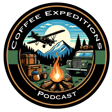
Ep #5 Coffee Expeditions: John 'Tilt' Stryker Meyer - US Army Special Forces Green Beret and Author
Welcome to another exciting episode of Coffee Expeditions, where we dive deep into fascinating conversations with extraordinary individuals from all walks of life. In this episode, we have the honour of hosting John 'Tilt' Stryker Meyer, a legendary figure in the world of special operations and a former Green Beret who served during the Vietnam War.
Join us as we sit down with John 'Tilt' Stryker Meyer, who takes us on a gripping journey through his time with the highly secretive MACV-SOG (Military Assistance Command, Vietnam – Studies and Observations Group). As a member of this elite unit, John participated in covert operations that pushed the boundaries of military strategy and courage. His stories provide a rare glimpse into the challenges and triumphs faced by those who served in one of the most intense and unconventional warfare environments.
This episode of Coffee Expeditions is a must-listen for anyone interested in military history, leadership, or personal stories of resilience and bravery. John Stryker Meyer’s experiences provide a unique and powerful perspective on the Vietnam War and the enduring legacy of those who served. Whether you're a history enthusiast or simply curious about the human spirit's ability to overcome adversity, John's stories will captivate and inspire you.
Grab your favourite cup of coffee and join us for an unforgettable conversation with John Stryker Meyer on Coffee Expeditions. This episode promises to be both enlightening and engaging, offering listeners a rare opportunity to learn from a true American hero.
For more about John Stryker Meyer check out his books and social media:
Instagram: @jstrykermeyer
Podcast: SOG Cast
Website: SogChronicles.com
Books: Across the Fence, On the Ground, SOG Chronicles
For more from Coffee Expeditions check us out on Spotify, Apple, YouTube and Instagram
